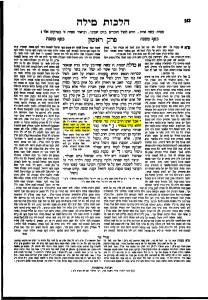Makos 13b
- In continuation to last week’s discussion whether or not a person can do Teshuvah on something that he is Chayav Kares, We mentioned the Teshuvah of the Noda B’yehudah (See here in English Hebrew):

The Noda B’Yehudah, Rabbi of Prague, in a famous responsum (Noda B’Yehudah Kama, O.C. 35) addresses a question posed to him by a Yeshiva student who had transgressed the halachos of adultery (“consecutively for three years”) and was now married the daughter of the adulteress.
The questioner he asked; was he required to divulge his transgression to the husband of the adulteress (who was his father-in-law!).

Halachically, it would seem that this poor the father-in-law cannot continue living with his wife, the adulteress.
In response, the Noda B’Yehuda assumed that the decision about whether or not to inform was based on the difference of opinion between the Rosh and the Rambam.
The Noda B’Yehuda wanted to rule leniently in that case, citing p’gam mishpacha – or the potential disaster this revelation would have had on the family.

the Noda B’Yehuda weighs in:
However, in the end, he too rules that the husband needed to be informed because the intimate relationship between the older man and his adulterous wife would be ongoing – with constant, recurring sin.
Part of the teshuvah addressees the request of the yeshiva student asking for a path of teshuvah to repent for his grave sin.

The Noda B’Yehudah discusses at length the concept of Teshuvah.
[We mentioned the sharp words the Noda Biyehuda, an opponent of Chasidus, has for the “contemporary musar books”. Was he referring to books of Chassidus?]

His basic assumption is that one must accept that there is no sin that teshuva can’t atone for.
On the other hand, we must say say that a Beis Din, despite the claim of teshuva by the accused, still dispenses malkus/misah (depending on the sin).
The reason for this anomaly is because if Beis Din were to accept the accused’s Teshuva then the entire concept of Malkus/Misah would be nixed. Every defendant would obviously tell the Beis Din “I did Teshuva and G-D forgave me……”
So we must say that the reason Beis Din still imposes punishment is because it is a Gezeiras Hakasuv that even though a person does Teshuvah he still gets punished by Beis Din for it.
See here for the Teshuvah at length
- It is interesting to note that the Rebbe in Likutei Sichos (Footnote 5) always quotes this Noda B’Yehudah but gives the reason of why Beis Din still punishes even though he did Teshuvah because of the rule “Ein Ledayan Ela Mah She’ainov Ro’os” – a judge can only rule on what he sees, and because the judge cannot see if the person really did teshuvah or not, he therefore still gets punished.

However the Noda B’Yehuda seemingly does not say that. He implies that the reason is because it is a Gezeiras Hakasuv.
See here for a lengthy discussion on this topic.
- We quoted the Ramabam in Hilchos Milah:
“If a father or Beis Din did not circumcise the child……when [the child] reaches bar mitzvah, he is obligated to circumcise himself. With each and every day that passes after he has reached bar mitzvah, he negates a positive commandment.
He is not, however, liable for karet until he dies uncircumcised, having intentionally [failed to perform the mitzvah].”
We discussed to wording of the Rambam that seem to imply that one who does not circumcise himself gets Kores ….when he dies?!
The Raavad comments on the last sentence and seems to say that he does not understand how the Rambam can say someone is Chayav Kares after he passes on!!
Rather he holds that he is Chayav kares every day that he does not circumcise himself.
More next week for some explanation into the Ramba”m…
Hit up the comments for some thoughts!
